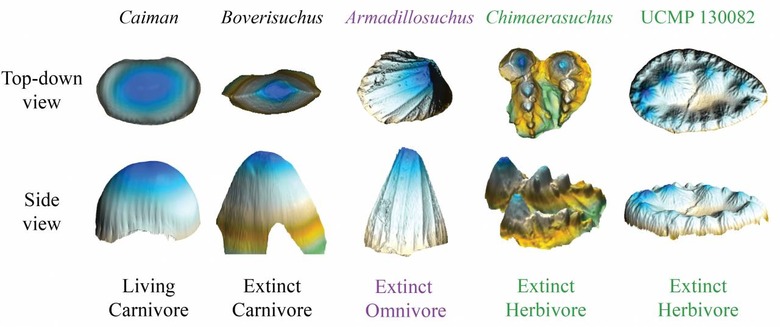Vegetarian Crocodile Ancestors Give Researchers A Surprise
Today's crocodiles and alligators may be voracious carnivores, but their early relatives had a vegetarian diet, surprising new research has revealed. While it's hard to imagine a modern-day croc opting for the foliage in a Florida garden, rather than eyeing the pets that live there, studies of fossilized crocodyliform teeth suggest that wasn't always the case.
In fact, the study carried out by researchers at the Natural History Museum of Utah at the University of Utah discovered, the extinct ancestors of today's beasts had a far more interesting – and varied – diet. Instead, evidence of a vegetarian diet has been discovered occurring at least three times.
While those ancient crocodyliforms may no longer be around to examine, their teeth are. In modern animals, they have basically conical teeth with a straightforward, even domed shape. The extinct crocodyliforms, though, had far more complexly-shaped teeth.
"Our study indicates that complexly shaped teeth, which we infer to indicate herbivory, appear in the extinct relatives of crocodiles at least three times and maybe as many as six," Keegan Melstrom, a doctoral student at the University of Utah and lead author of the study, said of the findings. He and the rest of the research team looked at sixteen different species of extinct crocodyliforms, with a total of 146 teeth used to generate 3D models.

It's been enough to pinpoint when, exactly, these plant-eating crocodyliforms were around. They first appeared early on in the evolutionary history of the group, just after the end-Triassic mass extinction. That period of activity lasted until the end-Cretaceous mass extinction, responsible for killing off all of the dinosaurs, bar birds.
Finally, the tooth analysis suggests that herbivory was common independently a minimum of three times – but potentially as many as six – in Mesozoic crocodyliforms.
"Some were similar to living crocodilians and were primarily carnivorous, others were omnivores and still others likely specialized in plants," Malstrom explains. "The herbivores lived on different continents at different times, some alongside mammals and mammal relatives, and others did not."
What's still to be figured out is what prompted the different diets and types of teeth. One possibility is that the crocodyliforms were reacting to dietary ecology: the relative availability of different food types in the periods following mass extinction events. That led to plant-munchers on the one hand, but also fearsome predators like the Carnufex carolinensis – or the "Carolina Butcher" – a nine foot long predator that was first identified back in 2015.
